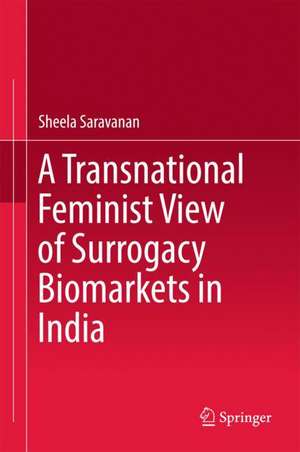A Transnational Feminist View of Surrogacy Biomarkets in India
Autor Sheela Saravananen Limba Engleză Hardback – 5 apr 2018
| Toate formatele și edițiile | Preț | Express |
|---|---|---|
| Paperback (1) | 579.20 lei 6-8 săpt. | |
| Springer Nature Singapore – feb 2019 | 579.20 lei 6-8 săpt. | |
| Hardback (1) | 585.40 lei 6-8 săpt. | |
| Springer Nature Singapore – 5 apr 2018 | 585.40 lei 6-8 săpt. |
Preț: 585.40 lei
Preț vechi: 688.71 lei
-15% Nou
Puncte Express: 878
Preț estimativ în valută:
112.03€ • 116.25$ • 93.64£
112.03€ • 116.25$ • 93.64£
Carte tipărită la comandă
Livrare economică 15-29 martie
Preluare comenzi: 021 569.72.76
Specificații
ISBN-13: 9789811068683
ISBN-10: 9811068682
Pagini: 169
Ilustrații: XV, 183 p. 7 illus.
Dimensiuni: 155 x 235 x 19 mm
Greutate: 0.46 kg
Ediția:1st ed. 2018
Editura: Springer Nature Singapore
Colecția Springer
Locul publicării:Singapore, Singapore
ISBN-10: 9811068682
Pagini: 169
Ilustrații: XV, 183 p. 7 illus.
Dimensiuni: 155 x 235 x 19 mm
Greutate: 0.46 kg
Ediția:1st ed. 2018
Editura: Springer Nature Singapore
Colecția Springer
Locul publicării:Singapore, Singapore
Cuprins
1. Indian Surrogacy Biomarkets: An Introduction.- 2. Surrogacy Globalscape.- 3. A Feminist discourse on Surrogacy: Reproductive Rights and Justice Approach.- 4. Situating India in the Globalscape of Inequalities.- 5. Surrogacy Biomarkets in India: Stratified Reproduction and Intersectionality.- 6. The Postcolonial Paradox and Feminist Solidarity.- 7. Transnational Feminism for Reproductive Justice.- 8. Towards Humanitarian Assisted Conception.
Recenzii
“A Transnational Feminist View of Surrogacy Biomarkets in India addresses the development of a market for surrogate motherhood in India, tackling new reproductive technologies and medical competences … . Given the amount of scientific references and data, the book will be of interest for scholars and specialists, but also for all those activists, students, or general interest readers who deal with the legal and ethical issues raised by ARTs.” (Ana-Luana Stoicea-Deram, Metacritic Journal for Comparative Studies and Theory, Vol. 4 (01), july, 2018)
Notă biografică
Sheela Saravanan, PhD, has two master's degrees from the Universities of Bombay and Pune in India in Geography and Development Planning. Her Ph.D. from Queensland University of Technology, Brisbane, Australia in Public Health was on the influence of biomedical frameworks of knowledge on local birthing practices in India. She has worked and published on the status of reproductive health in South Asia, violence against women and female infanticide in India earlier and now specializes in new and assisted reproductive technologies in the context of Asia and Europe. Since 2007 she has worked in the Universities of Heidelberg, Bonn and Goettingen in Germany. She has published on global injustice, exploitation and objectification in the process of commercial surrogacy in India. Since January 2016 she has been working at the South Asia Institute, University of Heidelberg on a DFG (Deutsche Forschungsgemeinschaft) funded project. The research aims to examine individual notions of ‘desired children’ (Wunschkinder/Vansh) shaped by social experiences in the German and Indian contexts that lead to selective abortions. She teaches Global Reproductive Technologies: Socio-Ethical and Legal Dimensions; Theories and Practice of Reproductive Technologies and Feminism and Public Health to bachelor’s and master’s students studying anthropology at the South Asia Institute, Department of Anthropology, University of Heidelberg, Germany.
Textul de pe ultima copertă
This book takes a reproductive justice approach to argue that surrogacy as practised in the contemporary neoliberal biomarkets crosses the humanitarian thresholds of feminism. Drawing on her ethnographic work with surrogate mothers, intended parents and medical practitioners in India, the author shows the dark connections between poverty, gender, human rights violations and indignity in the surrogacy market. In a developing country like India, bio-technologies therefore create reproductive objects of certain female bodies while promoting an image of reproductive liberation for others. India is a classic example for how far these biomarkets can exploit vulnerabilities for individual requirements in the garb of reproductive liberty. This critical book refers to a range of liberal, radical and postcolonial feminist frameworks on surrogacy, and questions the individual reproductive rights perspective as an approach to examine global surrogacy. It introduces ‘humanitarian feminism’ as analternative concept to bridge feminist factions divided on contextual and ideological grounds. It hopes to build a global feminist solidarity drawing on a ‘reproductive justice’ approach by recognizing the histories of race, class, gender, sexuality, ability, age and immigration oppression in all communities. This work is of interest to researchers and students of medical sociology and anthropology, gender studies, bioethics, and development studies.
Caracteristici
Applies a reproductive justice approach to ‘transnational feminism’ in an attempt to build a global feminist solidarity Provides ethnographical insights from the author’s empirical research in India Introduces ‘humanitarian feminism’ as a concept identifying humane thresholds that are crossed in asserting individual reproductive rights
